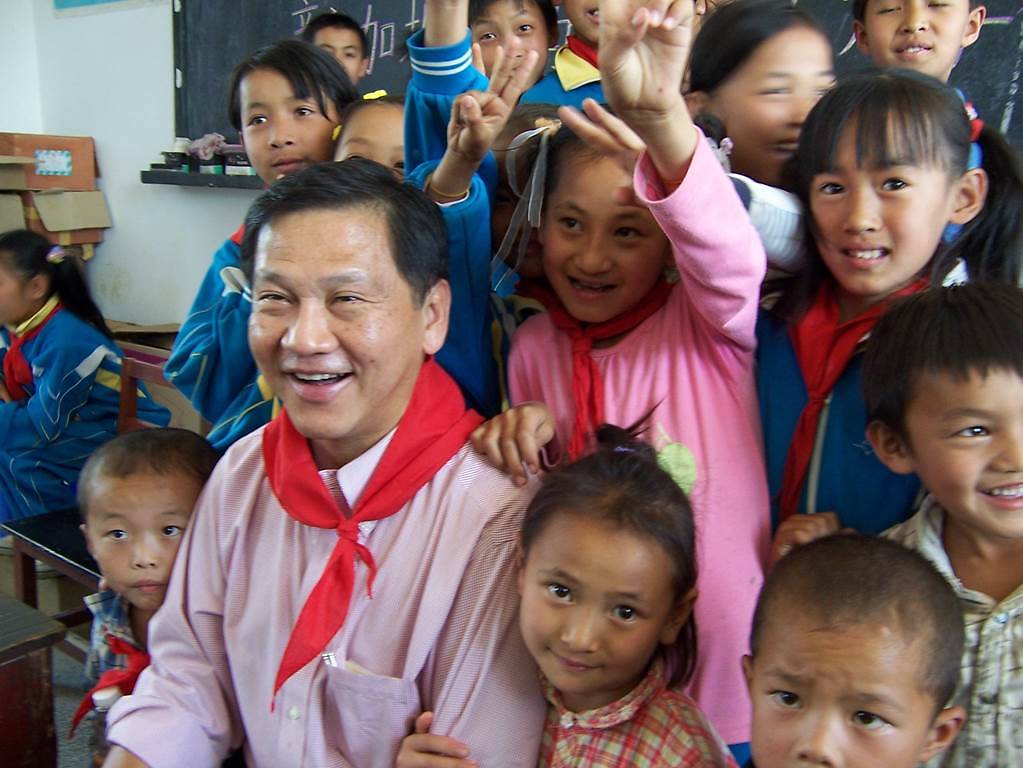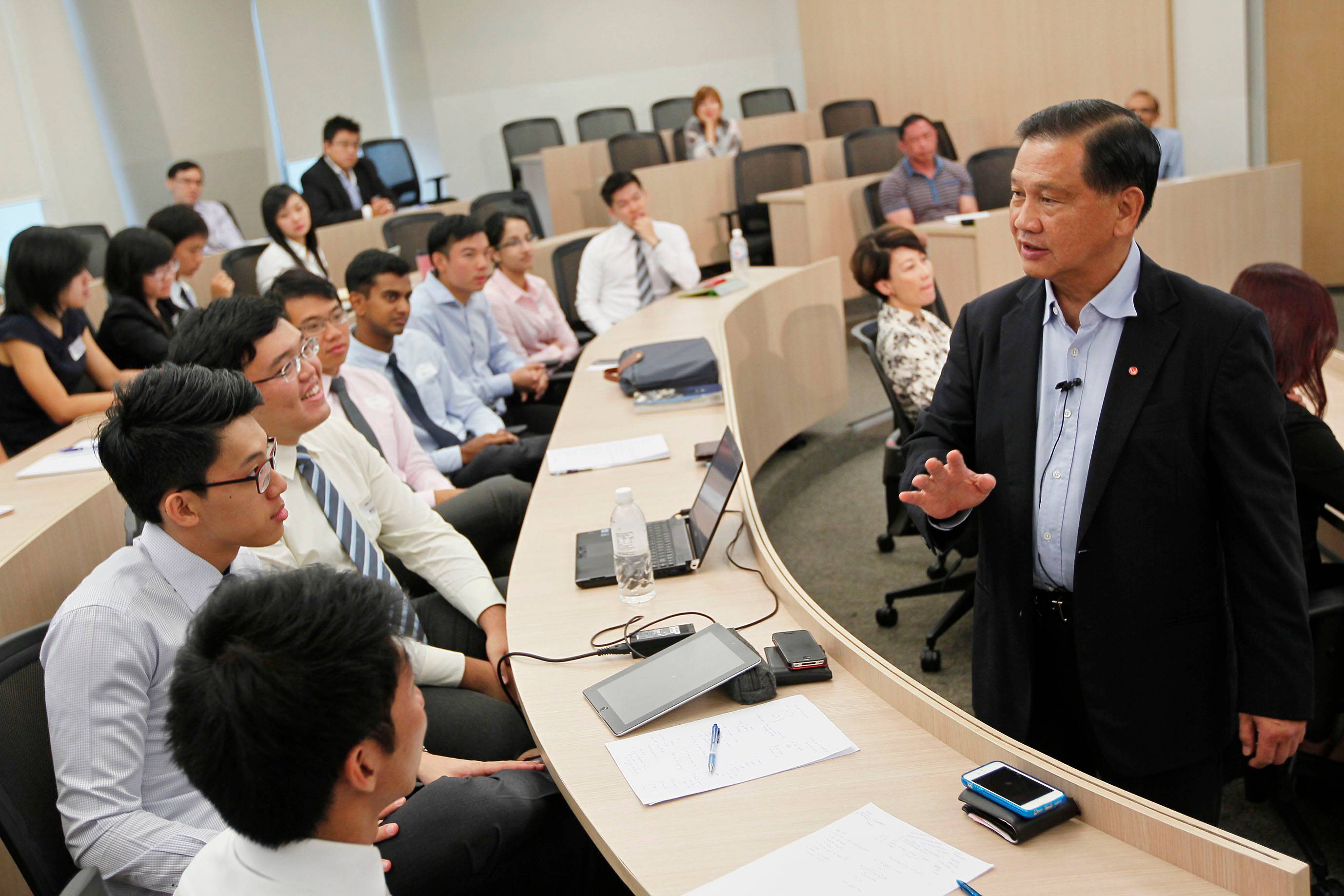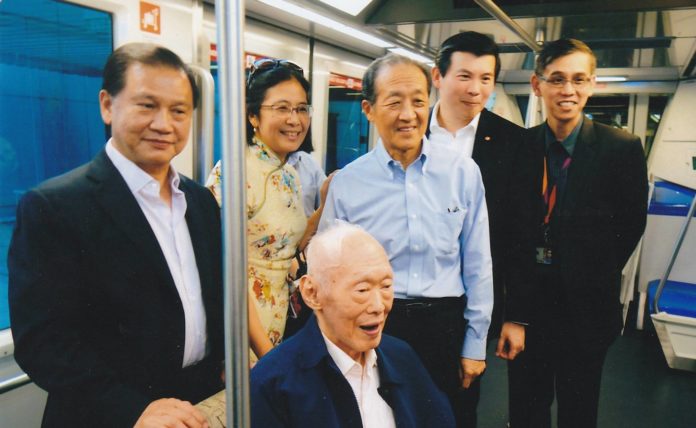SINGAPORE: There is no doubt that Liew Mun Leong has had an illustrious career. The current Chairman of Changi Airport Group (CAG) was also the founding President and CEO of CapitaLand Group, a public listed real estate company, between 1996 and 2012.
At 72, you might think that he would look back on his achievements and decide it is time to call it a day. But he famously says in practically every interview that he does not believe in retirement. He tells me the same thing, “For sure, you will turn senile if you stop doing work.”
His statement is influenced by what happened to his late father.
Mr Liew and his brother felt that they could provide for their father and persuaded him to retire at 67 from his job as a lathe machinist. His father, he says, became senile, declined and passed on.
Mr Liew clearly regrets this.
Hence, in addition to his chairmanships at CAG, Surbana Jurong and Pavilion Gas, he is Provost Chair and Professor (Practice) pro bono at NUS Business School and the Faculty of Engineering.
His sprightly manner belies his years and he maintains a glint of excitement in his eyes during our interview. Talking about his work and life often has that effect on him, he says.
“I WENT TO A GANGSTER-INFESTED SCHOOL”
Trained as a civil engineer, he spent 22 years in the public service developing Singapore’s Changi Airport, military airports and establishments.
In the private sector, over a span of 21 years, he led 10 publicly listed companies in four countries.
He achieved all this with what could be called a “modest” education.
“I always get quite upset when people ask me was in Raffles Institution or whether I went to Cambridge or Oxford. I say, ‘No. I went to a gangster-infested school called Queenstown Technical School.’ In those days they were all gangster schools and I didn’t get a scholarship to Cambridge or Oxford or Harvard but I think what’s important is you have the fundamental training and you are prepared to use common sense and pragmatism to do things.”
He graduated from the National University of Singapore, but when he went on to be a civil engineer building camps for the Ministry of Defence, he noticed he stood out.
“When I joined the Ministry of Defence, I was the first civil engineer there and I was swamped by scholars. Almost everybody is a scholar. I’m one of the few non-scholars.”
He didn’t let it bother him though.
“I told myself that I have no fear of them. Why should I? It’s about your own confidence level, your own thinking that you can deliver.”
His career choice to be an engineer was inspired by his father.
“He admired engineers when he worked as a machinist. He was just a workshop person. The engineers were the ones who gave workers overtime pay and instructions and could remove you if they chose. At that time, they were typically British and he would come back and tell us how great they are. They were like God to him. So I said, ‘I can be God also’.”

Liew Mun Leong with the late Mr Lee Kuan Yew at Changi Airport. (Photo: Changi Airport Group)
ARE HIGHER FEES AND LEVIES AT CHANGI AIRPORT JUSTIFIABLE?
His civil engineering skills enabled him to build Changi Airport’s first runway.
Today, Changi Airport has won numerous accolades and been named the world’s best airport several years in a row.
However, recent news that travellers flying out of Changi Airport will have to pay more in passenger fees and levies from Jul 1 to fund a major expansion of the airport, including the building of Terminal 5, has invited criticism.
The expansion is needed to keep up with growth and maintain Changi’s regional hub status.
It will mean that airlines will also see increased costs. Landing, parking and aerobridge fees, which are applicable to all flights at Changi Airport, will increase by 1 per cent from Jul 1. It will be further increased by 1 percent a year until 2024, when a review will be conducted.
The bulk of the costs will be borne by the Government and CAG, which operates the airport, but even this has not placated travellers and airlines.
As chairman of CAG, he feels the charges are justifiable.
“The project costs tens of billions of dollars. It’s an astronomical amount and it’s really a strain on the budget. So the Government has to work out how to finance this tens of billions of dollars. Fortunately we have built up a strong balance sheet but that’s not enough and if we have to get grant to get it done, it will also be a big strain on the reserve, on the overall budget. To me, the public who is using it is gaining a lot and we must start to learn how to pay for it.”
Others such as Hong Kong International Airport (HKIA) and those in Dubai and the United Arab Emirates have introduced similar charges to fund their own growth plans.
But the International Air Transport Association (IATA) has spoken up against this, saying it opposes pre-funding.
“You can start charging when it’s built but then there will be a big hole first in our budget. We are already building the third runway and we will use the third runway in three years or so. We need to share the burden of this big huge budget with the public who is using it,” he says.
He admits he considered other options.
“I can absolutely say to the Government that I can use the capital market to finance entirely the whole project. There will be a lot people, a lot of Wall Street bankers who will say, ‘We will help finance it.’ There will be plenty of people who want to invest in the best airport in the world. But the airport will be partially owned by the capital market. Do you want that? I don’t like the idea because once it is owned by the capital market, they can then do a lot of things that you will not agree in the long term interest of Singapore.”
IATA has called for more transparency on the projected costs and the proportion paid by the Government, CAG and users. This is something HKIA has been transparent about.
But Mr Liew reiterates that the Singapore Government has so far “decided that we should not discuss the total budget”.
“I think the budget is something that the Government wants to manage progressively. In a very big budget situation, the Government will have the prerogative to keep that confidentiality.”
Others have suggested tiered charges with budget airlines being charged lower fees.
“We think that it’s got to be shared equally. In the airports, when you land, you land. Whether you are a bigger aircraft, lighter aircraft, it doesn’t make any difference. If you want to use a good facility, you will accept that these are the charges.”
He seems confident that Changi Airport can remain competitive in spite of being one of the most expensive airports in the region for users.
“I think we will have to make it competitive by our service level, by our efficiency. We need to have a terminal big enough where we can cope with the demand and where we can also cope with the level of services that we now have.
“We have to keep the Changi experience, the service level. Do the bags come in early? We have standards. The first bag must come in within 11 to 12 minutes. Does it happen? What happens to cases where the bags are lost? How do we recover it?”

Liew Mun Leong also sits on the board of CapitaLand Hope Foundation (the philanthropic arm of CapitaLand). (Photo: CapitaLand)
REITS ARE “A PROBLEM” TODAY
Mr Liew is also known for being the founding President and CEO of CapitaLand Group.
He was instrumental in many of its successes, including venturing overseas.
“We were advised against it. People said nobody has made money doing overseas real estate but we said we have no choice. The market here was too small. So we went to China and we started from fundamentally building, a foreign company in real estate in China and we did it. It’s about patience and I got a group of very, very good outstanding people to work with me and we just told ourselves that we will make it.”
But there are other aspects of his career in real estate that he doesn’t seem very proud of.
He pioneered Real Estate Investment Trusts (REITS) in Singapore. REITS are widely believed to be driving up rents in malls and putting a strain on retailers while benefiting investors.
“I think the problem is not with our REITS. The problem is what other people do with REITS. The way we manage our REITS is we have a shopping mall and we try to do asset enhancement. That means we try to enhance the property whether it’s Raffles City or somewhere. We try to see where are the additional spaces we can commercialise, what renovation we can do, what asset enhancement we can do to create the dividend.
“If you look at Raffles City, we just put one more floor in the atrium and suddenly we have much more space, more tenants paying comparatively less in terms of rent at that time. So our rental increase for the first three years was only about 3 to 6 percent. The bulk of our dividend come not from rental increase. It came from asset enhancement, how we use the space more effectively, more efficiently or to change the product mix. So that is very professional management of the REITS.”
Clearly, he feels what is happening today in the REITS sector is unprofessional.
“Some REITS are just saying, ‘I put this shopping mall in the REITS. I’m going to increase rent, increase rent’, and I admit this is now a problem. I think today landlords are not doing enough in terms of increasing the productivity of the space.”
He seems to take it personally as it has affected retailers he has been loyal to for many years.
“There is a hairdresser I have been going to for the last 16 years. Recently they said, ‘Mr Liew, you can’t do your hair here because they want to increase the rent by 40 per cent. I’m only a hairdresser. I cannot cut 40 per cent more hair.’
“I think the landlord must understand this but they say, ‘Oh, I can get another retailer who is prepared to pay the amount.’ But my thinking is instead of just chasing rent, you must have long-term relationship with tenants. You must have the understanding that your retailer is your partner. If he cannot survive, he will go.”
But what do the landlords have to lose since, as he himself pointed out, there’ll be other potential tenants willing to pay?
“But it will come to a crash. The reason why this is happening is that a lot of people enter into the retail market without understanding the business. Somebody has a daughter who wants to start a restaurant, somebody has a wife who wants to start a boutique and there are new entrants and these new entrants do not understand the business. They don’t understand the calculation. They enter the market, pitch it high and then they go under and close shop. This is a very unhealthy trend.”
LESSONS OF A LIFETIME
He himself has had to learn some painful lessons. We talk about one his failures that still haunts him.
“I lost the Integrated Resorts tender. It was so painful. Somebody with a better background to beat us to it. For example with Marina Bay Sands, we were very competitive. The Government said you need 400,000 square feet of space. So we proposed 400,000. Sheldon Adelson built 400,000 plus one more million square feet. He won. One more million square feet of MICE which cost him S$1 billion more. So how did he survive? Do you know how he survived? Because it cost him $1 billion, his market value went up S$3 billion. I wish I had seen that part of it.”
It was one of the most important lessons he learnt in the private sector.
But he learnt several before that including when he made the transition from bureaucrat to businessman.
“Many people doubted me, but I think as a civil servant, I developed certain capabilities. For example, a high degree of integrity but more importantly, all these years, 22 years in the Government, I learnt to be a pragmatic civil servant.”
Overcoming bureaucracy was a process that he mastered quickly.
“There was a heavy burden on me to get things done and I was prepared to make discretional decisions to get things done.”
One of the examples he gives me goes back to the early days of building Changi Airport.
“When we first started Changi, it was really a massive site but the budget said that you can only have this number of staff and this number of equipment, but we couldn’t support the project. I couldn’t even get a modern typewriter or a fax machine. It will take years to approve. So what did I do? I put it all under the contractor supply services. You supply to me a fax machine, typewriter, everything and it is under the contract to be paid for, then returned. The contractor is supplying equipment anyway so now I’m saying that in addition to supplying equipment, you supply these other things to support the project.”
Even though some claim he was circumventing the rules, he says it was above board and even checked the Government’s instruction manual on such issues to be sure.
He is naturally a pragmatic person, he says.
“Finding solutions to problems without necessarily referring to past precedents or doctrines or theories or dogmatic thinking and at the same time, keeping your core values right, doing it for the right reasons. I was always prepared to answer for it.”

Liew Mun Leong teaches pro bono at the NUS Business School. (Photo: NUS Business School)
THE MERITS OF “BRAINWASHING”
Today, his lectures to students are peppered with such examples.
“I always think that education is a very committed task. Unless your people are educated and you are better-trained, you will not get a good workforce.”
He started a training institute in CapitaLand called CLIMB which stands for CapitaLand Institute of Management and Business.
“The ‘B’ also stands for brainwashing,” he says facetiously.
“My version of brainwashing is that you will have certain views that we might disagree with and we try to change it.”
That sounds dangerous, I remark.
“No, no. For example, we think that integrity is very important, so if you don’t have it, we have to brainwash you! Nothing to do with some ulterior motive to direct you in an untoward way,” he says laughingly.
Over the years, he claims he has managed to do 8-hour lectures towards this effort.
“If I invest in my staff to teach them the right things, I save a lot of my time, I save a lot of my problems down the road.”
As he teaches young aspiring entrepreneurs today, he feels many have romanticised the idea of running a business.
“To be an entrepreneur is one thing. To be a business manager is another thing. But you need both. Most youngsters come into it without knowing what is it all about.”
“I DON’T WANT TO BE ON MY DEATHBED AND SAY I HAVEN’T DONE ENOUGH”
At 72, he certainly knows what it is all about and continues to have business goals to achieve.
“I want to build urban-planning consultancy Surbana Jurong into a powerhouse. We are in 40 countries. I want Singapore to have a company that can do urbanisation and infrastructure project all over Asia. It’ll be like building another CapitaLand. And of course developing Changi Airport.”
“I don’t want to be on the death bed and say I haven’t done enough.”
His proudest achievement remains Changi Airport.
“From day one, over 40 years ago and I’m still there.”
When asked what he hopes his legacy will be though, he says he doesn’t think about it.
“Actually, I don’t need legacy. Why do I need legacy? People know me. They recognise me in the streets to talk to me. My main job is to help others. How do I help the CEOs to see? How do I build talent in schools? I do these things pro bono but I feel that I am occupied and I’m growing.”





